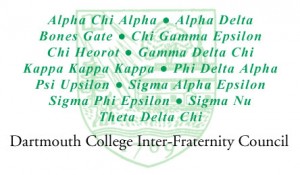The Dartmouth Review recently sat down with Wilson Chockley, president of the Inter-Fraternity Council (IFC), to discuss the recent changes enacted within the Greek system.
The Dartmouth Review (TDR): We’ve all seen the headlines — the IFC has voted to ban “pledge term,” and that “newly selected members of IFC fraternities shall be considered full members upon joining a house.” To what extent can fraternities still have their “newly selected members” participate in team building activities? How do you intend to foster the types of brotherly bonds and relationships that have made Dartmouth’s Greek system so unique in the past?
Wilson Chockley (WC): The IFC’s vote to eliminate the pledge period was created to eliminate the harmful behaviors that some associate with induction into a fraternity. We wanted to make sure that new members are inducted straight into the brotherhood with full rights of brothers instead of having them wait six weeks to do so. Constructive, team building activities are still submitted to GLOS [Greek Life and Societies] for approval, and if GLOS approves them, they are allowed.
TDR: There has been a lot of criticism of the IFC regarding this recent decision. A lot of it is less about actual hazing and more about a perceived sense of the IFC kowtowing to the administration. What was the IFC’s thought process behind the move?
WC: There has been an enormous amount of negative press surrounding Dartmouth in the last few years, and most of it has centered on the Greek system. This has caused many alumni, faculty, and administrators to see eliminating fraternities (or making some other drastic change) as the easiest and most effective way to deal with with what they see as fraternity-specific problems. I disagree that many of these issues, such as high risk drinking and sexual assault are fraternity-specific. Instead, I believe they are societal issues that must be addressed, but eliminating fraternities is not the correct way to do so. Hazing, however, is a fraternity issue and making internal changes within the Greek system is the best way to address it. I see the IFC policy as a way for us to make positive change at a time when we are under intense scrutiny instead of sitting on our heels and waiting for change to be forced on us.
TDR: How do the IFC and the Administration intend to enforce such a policy?
WC: Hazing is against the law, against college policy, and banned by the IFC. As such, the enforcement procedures are already in place to deal with such issues. Clearly, this has not been one hundred percent effective in preventing some of the negatives associated with the pledge period, though. The statement from the IFC this fall puts responsibility on fraternity presidents and other members of fraternities to reexamine current practices and focus on the positives of community and team building exercises.
TDR: How do you think this will affect individual fraternities and Dartmouth’s Greek system as a whole?
WC: I think the statement has had and will have a positive effect on fraternities and the system as a whole. Almost every fraternity president I’ve spoken to has said his house has decided to eliminate activities that have been done in the past due to these activities’ less constructive nature.
TDR: There have been some opinions out there that the lack of a pledge term could worsen Dartmouth fraternities’ bonds, thereby making the system more superficial and corrupting what Dartmouth’s famously “inclusive” Greek system had to offer; many are going as far as to say that it is the beginning of the end of the Greek system. How would you respond to this?
WC: I think that calling this statement the beginning of the end of the Greek system is completely ridiculous. This statement by the IFC serves to make the already strong Greek system even better and helps keep it alive in a relatively hostile atmosphere.
TDR: Did any of the member fraternities of the IFC bring up any objections? What were such objections?
WC: This statement by the IFC was unanimously supported by the fraternity presidents.
TDR: Our ’17 readers probably have a lot of questions regarding this ruling as it is most pertinent to their upcoming term. Do you have any words of advice or feedback to them regarding this decision and regarding their new relationship with their Greek houses?
WC: My advice to the ’17s entering fraternities this fall is to enjoy this exciting time and feel free to voice any concerns they might have to me or their respective fraternity presidents.
TDR: Many on campus are speculating that the pledge term ban will simply force “hazing” to go even more underground, thereby significantly reducing individual fraternities’ accountability in the process. How would you respond to this?
WC: Any hazing that might have gone on before would have been underground, as it is illegal. Instead of driving hazing further underground, this statement creates the perfect opportunity for fraternities to change entrenched, negative practices from the bottom up, rather than from the top down.


Be the first to comment on "An Interview with the IFC President"